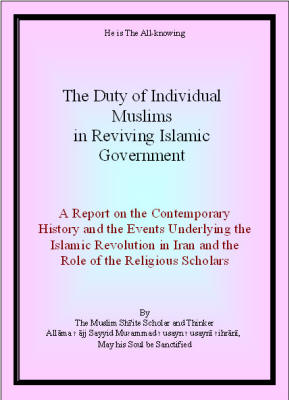
Happiness can be achieved only by thorough implementation of Divine Law.
Subject of the Book : How Can an Islamic Government be Implemented?
■ Why should Islamic government be sought?
■ Where is the starting point for setting up an Islamic government?
■ What factors were originally involved in the revolution of Iranian people?
■ What is the Islamic constitution like?
■ Who is the leader in the Islamic government?
■ What is the duty of the authorities who object to the leadership’s thoughts and views?
The issues in this collection are based on historical facts in form of six lectures from the epistolary writings (munsha’āt) of Allama Ayatollah Tihrānī, may Allah sanctify his soul, for the scholars and religious students of Mashhad, compiled and organized by one of the learned scholars.
Excerpts from the book:
• It is the Islamic thought that can rectify the society.
• Islamic thought is compatible to the realities of the Existence.
• It is just the mind and the heart connected to the Divine Dominion that can rightly comprehend and implement Islam.
Some of the executive suggestions by Allama Ayatollah Tihrānī, may his soul be sanctified, for the structure of the society and government at the beginning of the Islamic Revolution:
• Obligatoriness of performing Friday Prayer
• Establishment of National Resistance Force
• Restoration of Public Jihād and military training
• Necessity of getting married upon reaching puberty
• Correction of the pattern for ḥijāb
• Change of hour on the basis of [starting from] the sunset
• Change of the Calendar from Solar to Lunar
• Change of the Military Uniform on the basis of Islamic models
• Prohibition of smoking
• Rendering education and medical care free of charge
• Employing foreign instructors instead of sending students abroad
• Declaring the beginning of each month in every city
• Calling to prayer (adhān) at five different prayer times
• Encouraging mahr al-Sunna (bridal portion as common in Islamic traditions) in marriage
• Establishment of every city’s required factories in that same city
• Removal of precautionary measures from juridical edicts (risāla ‘ilmiyya) and finalizing the legal judgments (fatāwā)
• Prohibition of beggary
This volume consists of remarks on contemporary history and the scholars’ attempts in eradication of disbelief (kufr) and establishment of an Islamic Government.
Persian & Arabic full text